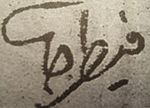
Back عبد الرؤوف فطرت Arabic عبد الرؤوف فطرت ARZ Əbdürrauf Fitrət Azerbaijani عبدالرئوف فطرت AZB আব্দুরাউফ ফিতরাত Bengali/Bangla Abdurauf Fitrat Catalan Abdurauf Fitrat German Abdurrauf Fitrat French アブドゥラウフ・フィトラト Japanese Абдуррауф Фитрат Kazakh
This article should specify the language of its non-English content, using {{lang}}, {{transliteration}} for transliterated languages, and {{IPA}} for phonetic transcriptions, with an appropriate ISO 639 code. Wikipedia's multilingual support templates may also be used. (January 2024) |
Abdurauf Fitrat | |
|---|---|
 Abdurauf Fitrat on an Uzbek stamp published in honour of his 110th birthday (1996) | |
| Born | 1886 Bukhara, Emirate of Bukhara |
| Died | 4 October 1938 Tashkent, Uzbek SSR, Soviet Union |
| Occupation | Teacher, theorist, politician, educator, writer, and scholar |
| Literary movement | Jadidism |
| Signature | |
 | |
Abdurauf Fitrat (sometimes spelled Abdulrauf Fitrat or Abdurrauf Fitrat, Uzbek: Abdurauf Fitrat / Абдурауф Фитрат; 1886 – 4 October 1938) was an Uzbek author, journalist, politician and public intellectual in Central Asia under Russian and Soviet rule.
Fitrat made major contributions to modern Uzbek literature with both lyric and prose in Persian, Turki, and late Chagatai. Beside his work as a politician and scholar in many fields, Fitrat also authored poetic and dramatic literary texts. Fitrat initially composed poems and authored essays and polemic prose in the Persian language, but switched to a puristic Turkic tongue by 1917. Fitrat was responsible for the change to Uzbek as Bukhara's national language in 1921, before returning to writing texts in Tajik later during the 1920s. In the early 1920s, Fitrat took part in the efforts for Latinization of Uzbek and Tajik.
Fitrat was influenced by his studies in Istanbul during the early 1910s, where he came into contact with Islamic reformism and authored several philosophical essays. After returning to Central Asia, he turned into an influential ideological leader of the local jadid movement. In opposition to and in exile from the Bukharan emir he sided with the communists. After the end of the emirate, Fitrat accepted several posts in the government of the Bukharan People's Soviet Republic, before he was forced to spend a year in Russia. Later, he taught at several colleges and universities and held a research position at the Academy of Sciences of the then Uzbek SSR.
During Stalin's Great Purge, Fitrat was arrested and prosecuted for counter-revolutionary and nationalist activities, and finally executed in 1938. After his death, his work was banned for decades. Fitrat was rehabilitated in 1956, yet critical evaluation of his work has changed several times since. While there are Tajik criticis that call the likes of Fitrat "traitors", other writers have given him the title of a martyr (shahid), particularly in independent Uzbekistan.
© MMXXIII Rich X Search. We shall prevail. All rights reserved. Rich X Search